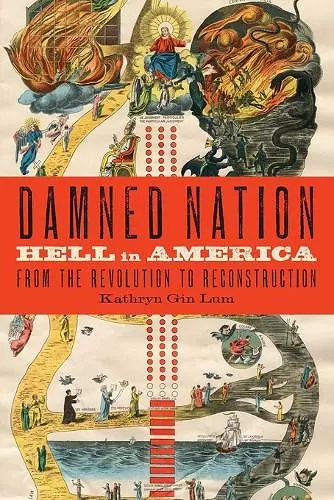Damned Nation
Hell in America from the Revolution to Reconstruction
Format:Paperback
Publisher:Oxford University Press Inc
Published:13th Apr '17
Currently unavailable, and unfortunately no date known when it will be back
This paperback is available in another edition too:
- Hardback£34.99(9780199843114)

Among the pressing concerns of Americans in the first century of nationhood were day-to-day survival, political harmony, exploration of the continent, foreign policy, and--fixed deeply in the collective consciousness--hell and eternal damnation. The fear of fire and brimstone and the worm that never dies exerted a profound and lasting influence on Americans' ideas about themselves, their neighbors, and the rest of the world. Kathryn Gin Lum poses a number of vital questions: Why did the fear of hell survive Enlightenment critiques in America, after largely subsiding in Europe and elsewhere? What were the consequences for early and antebellum Americans of living with the fear of seeing themselves and many people they knew eternally damned? How did they live under the weighty obligation to save as many souls as possible? What about those who rejected this sense of obligation and fear? Gin Lum shows that beneath early Americans' vaunted millennial optimism lurked a pervasive anxiety: that rather than being favored by God, they and their nation might be the object of divine wrath. As time-honored social hierarchies crumbled before revival fire, economic unease, and political chaos, "saved" and "damned" became as crucial distinctions as race, class, and gender. The threat of damnation became an impetus for or deterrent from all kinds of behaviors, from reading novels to owning slaves. Gin Lum tracks the idea of hell from the Revolution to Reconstruction. She considers the ideas of theological leaders like Jonathan Edwards and Charles Finney, as well as those of ordinary women and men. She discusses the views of Native Americans, Americans of European and African descent, residents of Northern insane asylums and Southern plantations, New England's clergy and missionaries overseas, and even proponents of Swedenborgianism and annihilationism. Damned Nation offers a captivating account of an idea that played a transformative role in America's intellectual and cultural history.
Damned Nation is a heavenly book. It is beautifully written, deeply researched, and clearly argued.... Kathryn Gin Lum meticulously examines one of the least noticed yet most pervasive and powerful forces in the culture: the conviction that people who died outside the faith would endure everlasting damnation in hell.... [R]ich with insight and scholarly achievement. * Journal of American History *
This fascinating, original, beautifully written account deals with how ministers formulated threats of Hell and how lay people responded. We read a multitude of introspections by men and women of every race and social station, Christian and non-Christian, sometimes leading them to belief in Hell, sometimes to its rejection. Throughout, the author takes the debate over Hell seriously. Her concluding section applies her analyses to the slavery controversy and the Civil War. * Daniel Walker Howe, Pulitzer-Prize-winning author of What Hath God Wrought: The Transformation of America, 1815-1848 *
Damned Nation is damned good and its contributions are legion. We enter American labyrinths where fears of hellfire singed souls and heated political discord in the early republic. We encounter abolitionists who damned the souls of black folk in order to free their bodies. We witness leaders and laity bickering as if rehearsing the conclave of fallen angels that began John Milton's Paradise Lost. And we march into a Civil War where the destruction drove new approaches to damnation. This book signals a new and evocative voice in the realm of American religious history, one that is not afraid to entertain its dark sides. * Edward J. Blum, co-author of The Color of Christ: The Son of God and the Saga of Race in America *
In this brilliant reassessment, Kathryn Gin Lum shows that the idea of hell, far from withering away under the weight of Enlightenment rationalism, was a fixture of the antebellum religious marketplace-a doctrine calculated to win converts both through attraction and aversion. Americans took the notion of eternal hell torments with deadly seriousness, and Gin Lum reveals just how central the doctrine was. An essential and compelling account. * Peter J. Thuesen, author of Predestination: The American Career of a Contentious Doctrine *
ISBN: 9780190662042
Dimensions: 231mm x 155mm x 23mm
Weight: 522g
330 pages